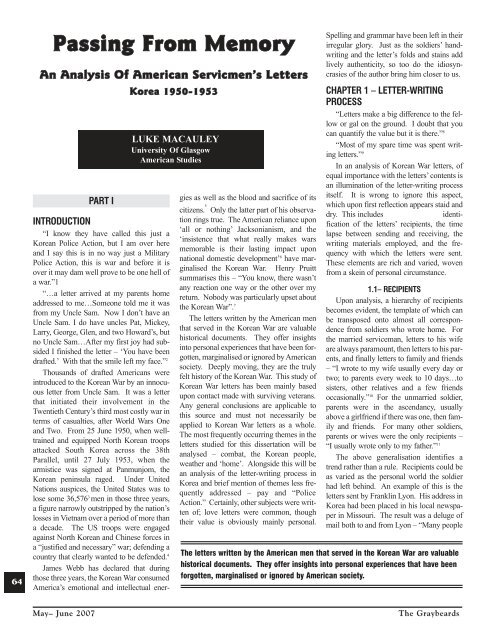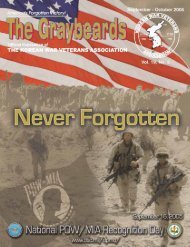2007 KWVA Election Results - Korean War Veterans Association
2007 KWVA Election Results - Korean War Veterans Association
2007 KWVA Election Results - Korean War Veterans Association
You also want an ePaper? Increase the reach of your titles
YUMPU automatically turns print PDFs into web optimized ePapers that Google loves.
64<br />
Passing From Memory<br />
An Analysis Of American Servicmen’s Letters<br />
Korea 1950-1953<br />
PART I<br />
LUKE MACAULEY<br />
University Of Glasgow<br />
American Studies<br />
INTRODUCTION<br />
“I know they have called this just a<br />
<strong>Korean</strong> Police Action, but I am over here<br />
and I say this is in no way just a Military<br />
Police Action, this is war and before it is<br />
over it may dam well prove to be one hell of<br />
a war.”1<br />
“…a letter arrived at my parents home<br />
addressed to me…Someone told me it was<br />
from my Uncle Sam. Now I don’t have an<br />
Uncle Sam. I do have uncles Pat, Mickey,<br />
Larry, George, Glen, and two Howard’s, but<br />
no Uncle Sam…After my first joy had subsided<br />
I finished the letter – ‘You have been<br />
drafted.’ With that the smile left my face.” 2<br />
Thousands of drafted Americans were<br />
introduced to the <strong>Korean</strong> <strong>War</strong> by an innocuous<br />
letter from Uncle Sam. It was a letter<br />
that initiated their involvement in the<br />
Twentieth Century’s third most costly war in<br />
terms of casualties, after World <strong>War</strong>s One<br />
and Two. From 25 June 1950, when welltrained<br />
and equipped North <strong>Korean</strong> troops<br />
attacked South Korea across the 38th<br />
Parallel, until 27 July 1953, when the<br />
armistice was signed at Panmunjom, the<br />
<strong>Korean</strong> peninsula raged. Under United<br />
Nations auspices, the United States was to<br />
lose some 36,576 3 men in those three years,<br />
a figure narrowly outstripped by the nation’s<br />
losses in Vietnam over a period of more than<br />
a decade. The US troops were engaged<br />
against North <strong>Korean</strong> and Chinese forces in<br />
a “justified and necessary” war; defending a<br />
country that clearly wanted to be defended. 4<br />
James Webb has declared that during<br />
those three years, the <strong>Korean</strong> <strong>War</strong> consumed<br />
America’s emotional and intellectual energies<br />
as well as the blood and sacrifice of its<br />
citizens. 5<br />
Only the latter part of his observation<br />
rings true. The American reliance upon<br />
‘all or nothing’ Jacksonianism, and the<br />
‘insistence that what really makes wars<br />
memorable is their lasting impact upon<br />
national domestic development’ 6 have marginalised<br />
the <strong>Korean</strong> <strong>War</strong>. Henry Pruitt<br />
summarises this – “You know, there wasn’t<br />
any reaction one way or the other over my<br />
return. Nobody was particularly upset about<br />
the <strong>Korean</strong> <strong>War</strong>”. 7<br />
The letters written by the American men<br />
that served in the <strong>Korean</strong> <strong>War</strong> are valuable<br />
historical documents. They offer insights<br />
into personal experiences that have been forgotten,<br />
marginalised or ignored by American<br />
society. Deeply moving, they are the truly<br />
felt history of the <strong>Korean</strong> <strong>War</strong>. This study of<br />
<strong>Korean</strong> <strong>War</strong> letters has been mainly based<br />
upon contact made with surviving veterans.<br />
Any general conclusions are applicable to<br />
this source and must not necessarily be<br />
applied to <strong>Korean</strong> <strong>War</strong> letters as a whole.<br />
The most frequently occurring themes in the<br />
letters studied for this dissertation will be<br />
analysed – combat, the <strong>Korean</strong> people,<br />
weather and ‘home’. Alongside this will be<br />
an analysis of the letter-writing process in<br />
Korea and brief mention of themes less frequently<br />
addressed – pay and “Police<br />
Action.” Certainly, other subjects were written<br />
of; love letters were common, though<br />
their value is obviously mainly personal.<br />
Spelling and grammar have been left in their<br />
irregular glory. Just as the soldiers’ handwriting<br />
and the letter’s folds and stains add<br />
lively authenticity, so too do the idiosyncrasies<br />
of the author bring him closer to us.<br />
CHAPTER 1 – LETTER-WRITING<br />
PROCESS<br />
“Letters make a big difference to the fellow<br />
or gal on the ground. I doubt that you<br />
can quantify the value but it is there.” 8<br />
“Most of my spare time was spent writing<br />
letters.” 9<br />
In an analysis of <strong>Korean</strong> <strong>War</strong> letters, of<br />
equal importance with the letters’ contents is<br />
an illumination of the letter-writing process<br />
itself. It is wrong to ignore this aspect,<br />
which upon first reflection appears staid and<br />
dry. This includes<br />
identification<br />
of the letters’ recipients, the time<br />
lapse between sending and receiving, the<br />
writing materials employed, and the frequency<br />
with which the letters were sent.<br />
These elements are rich and varied, woven<br />
from a skein of personal circumstance.<br />
1.1– RECIPIENTS<br />
Upon analysis, a hierarchy of recipients<br />
becomes evident, the template of which can<br />
be transposed onto almost all correspondence<br />
from soldiers who wrote home. For<br />
the married serviceman, letters to his wife<br />
are always paramount, then letters to his parents,<br />
and finally letters to family and friends<br />
– “I wrote to my wife usually every day or<br />
two; to parents every week to 10 days…to<br />
sisters, other relatives and a few friends<br />
occasionally.” 10 For the unmarried soldier,<br />
parents were in the ascendancy, usually<br />
above a girlfriend if there was one, then family<br />
and friends. For many other soldiers,<br />
parents or wives were the only recipients –<br />
“I usually wrote only to my father.” 11<br />
The above generalisation identifies a<br />
trend rather than a rule. Recipients could be<br />
as varied as the personal world the soldier<br />
had left behind. An example of this is the<br />
letters sent by Franklin Lyon. His address in<br />
Korea had been placed in his local newspaper<br />
in Missouri. The result was a deluge of<br />
mail both to and from Lyon – “Many people<br />
The letters written by the American men that served in the <strong>Korean</strong> <strong>War</strong> are valuable<br />
historical documents. They offer insights into personal experiences that have been<br />
forgotten, marginalised or ignored by American society.<br />
May– June <strong>2007</strong><br />
The Graybeards

















